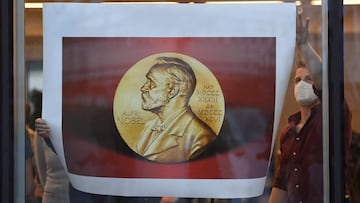Who won the Nobel Peace Prize? List and winners by year
One of the world's most prestigious prizes has been given out 101 times with the winner for 2021 is set to be announced on October 7.


First awarded in 1901, the Nobel Prize recognizes achievements in the sciences, Physics, Chemistry, Medicine, Economics, as well as in Literature and Peace. The latter, Peace, is probably the most famous and has been awarded to some colossi of history.
This year there 329 candidates, the third-highest total in history. The favorites are: Alexei Navalny, the Russian activist, The World Health Organization, Greta Thunberg, the climate activist and Svetlana Tikhanovskaya, the Belarusian activist.
But winners have not been without controversy, as evidenced by the winner of 2019's prize, Ehtiopian Prime Minister Abiy Ahmed, who has since been accused of overseeing numerous human rights violations in a recent conflict with the north Ethiopian province of Tigray.
Some famous names to have won the prize
There have been titans who have won the prize, as well as some people who are less internationally recognized.
For an American audience, champions include Martin Luther King Jr. and former President Barack Obama. King Jr. won the award for his fight against segregation, winning the prize in the year of his murder. Obama won the prize for strengthening international cooperation.
On 10 October 2014 @Malala was in a chemistry class at her school in Birmingham. During the class she received the news that she had been awarded the #NobelPeacePrize.
— The Nobel Prize (@NobelPrize) October 2, 2021
After hearing the news, Malala went back to her studies. She was only 17 years old at the time of the award. pic.twitter.com/j7xwPbovWq
On the global stage, winners include Malala Yousafzai, who, while being shot by the Taliban in Pakistan, is an outspoken proponent of women's rights in education around the world. Another is Nelson Mandela for his struggle and victory over the racist apartheid system in South Africa, compatriot Desmond Tutu won the award in years prior for the same reason.
One major omission is Mahatma Gandhi, the Indian independence figurehead who was murdered in 1948. It has since been accepted that he was nominated multiple time, 13 to be exact, and the committee has admitted that it was a mistake to never award him the prize.
"There are many causes that I am prepared to die for but no causes that I am prepared to kill for."
— The Nobel Prize (@NobelPrize) October 2, 2021
Remembering Mahatma Gandhi on the anniversary of his 152nd birthday. Gandhi was nominated for the #NobelPeacePrize on 12 occasions.
Read more: https://t.co/Q3cniIiZG9 pic.twitter.com/ny41efNQrY
Have there been any controversial winners?
The awards have been criticized for their inability to retract awards if winners have gone against the values of the organization. Key examples include Burmese leader Aung San Suu Kyi, who won the award for the fight against the Burmese army dictatorship. In recent years she has been accused of silence, or support, for the army's attacks on Burma's Muslim minority group, the Rohingya. She also led a crackdown on journalists in the country during her time in power.
Related stories
Henry Kissinger won the award in 1973 for his apparent efforts to bring the Vietnam War to a close. Kissinger was involved in the bombing campaign in neighboring Cambodia, escalating the war at the same time as extracting US forces. His co-winner, Le Duc Tho, declined the award.
Ethiopian PM Abiy Ahmed was sworn in on Monday despite the continuing conflict in Tigray and accusations of human rights abuses. @awolallo, who had nominated Ahmed for his Nobel Peace Prize back in 2019, gives his take.
— The Newsmakers (@The_Newsmakers) October 4, 2021
Full show here: https://t.co/fKyXDrAttO pic.twitter.com/hZeYoWxfYv
After negotiating the Oslo accords in 1994, talks that were supposed to finally decide the end of the Israeli occupation of Palestine, Shimon Peres, Yasser Arafat and Yitzhak Rabin were jointly awarded the Peace Prize. Members of the committee resigned at Arafat's victory, criticizing him for overseeing terror attacks on Israel. Rabin himself was assassinated by Israeli ultranationalists that same year, dooming the peace process. There has yet to be a formal end to the occupation and the Israeli government is committed to building settlements on Palestinian land, violating international law.

